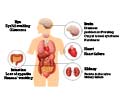Scientists at NYU Langone Medical Center have discovered that the beta amyloid peptide - which accumulates in brain plaques in people with Alzheimer's disease - not only plays a role
The beta amyloid peptide, which is linked to development of Alzheimer's disease, is also crucial in modulating learning and memory consolidation in the normal brain, according to new research by scientists at NYU Langone Medical Center.
Dr. Paul M. Mathews, an Assistant Professor in the Department of Psychiatry, has revealed that the finding results from a study on rats, wherein his team manipulated levels of the beta amyloid peptide.During the study, the researcher controlled peptide levels in a region of the brain that is important in learning and memory.
Dr. Mathews says that the study suggests that the peptide's disruption may be one of the underlying causes of nerve dysfunction during Alzheimer's disease pathogenesis.
A presentation on the study was made at the ongoing Alzheimer's Association 2008 International Conference, which ends on July 31 in Chicago.
Source-ANI
RAS/L










